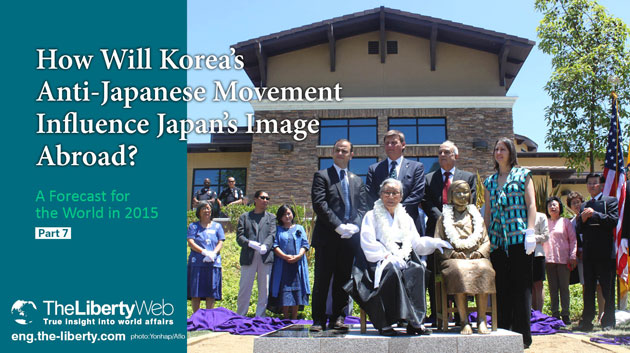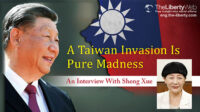How Will Korea’s Anti-Japanese Movement Influence Japan’s Image Abroad?
What Is America's Issue with the 'Comfort Women'?
The comfort woman statue set up in Glendale City, California in July, 2013(photo: Yonhap/Aflo)
Ethnic Korean groups have already set up ‘comfort women monuments’ and ‘comfort women statues’ in 9 locations including on private properties. Last year, there was a move to set up a new monument in Fullerton City, California. We will report what’s been happening in Fullerton based on some interviews we’ve had there.
“The government of Japan should formally acknowledge its historical responsibility and apologize.” ― in mid-September of 2014, U.S. Rep. Ed Royce, who is chairman of the House of Representatives Foreign Affairs Committee, made this claim at Fullerton City’s Council meeting. Beside him, Mayor Doug Chafee nodded approvingly.
What U.S. Rep. Royce referred to as Japan’s “historical responsibility” related to what he thinks happened to the so-called comfort women. He made this remark at a public hearing held to consider demands from ethnic Korean groups to place a monument to honor the comfort women at the Fullerton Museum Center.
One of the main groups, which has been insisting on the installation of the memorial, is the Korean American Forum of California (KAFC). This anti-Japan civic group also played a leading role in installing a ‘comfort women’ statue in Glendale City, California, which since 2013 has often made the news in Japan. KAFC laid sufficient groundwork in the area to gather attention such as by asking Korean Americans in the city to get annual free passes to the museum. After all was said and done, despite rebuttals from Japanese Americans who gathered at the hearing, the City Council of Fullerton passed the bill to install the statue in front of the museum by a 3-2 vote.
Similar memorials have already been set up in 9 locations since Korean activists erected the first one in Palisades Park, New Jersey in 2010. Lee Jong Sung, president of the Federation of Korean Association, USA, stated publicly that he aims to place comfort women memorials in every big city in America. Even white lawmakers have been actively supporting his efforts in order to win votes from his Korean American members.
A Cat-And-Mouse Game in the Installment of the Comfort Women Monument

The volunteers who submitted about 8,000 signatures opposing the installation of the comfort women statue in Fullerton
At the hearing, the City Council of Fullerton passed the bill to place the statue, but it left all of the decision making about whether to set up the monument to the executive board of museum.
Feeling resentment over the anti-Japan movement based upon the fact that people in authority fabricated the comfort women’s accounts after WW2 ended, several groups of Japanese Americans worked together to collect about 8,000 signatures against the installation of the comfort women statue, including signatures gathered in Japan, and they submitted their petitions to the Fullerton City Council. Along with this move, Fukui City’s Council, Fullerton’s Sister City in Japan, adopted a resolution against setting up the monument. Partly because these efforts were successful, the executive council of the museum has postponed making its decision.
However, the executive board of the museum includes two Korean Americans, and the museum is scheduled to have an exhibition on the comfort women, so there is no denying the possibility that the museum will approve the installation of the statue. Yumiko Yamamoto, President of Nadeshiko Action, a Japanese civic group that worked on collecting the signatures, answered our call for an interview. She bit her lip and said, “These movements have been occurring quite often in California. It’s been like a cat-and-mouse game.” Korean activists have been mainly lobbying in municipalities of California and New Jersey where they have large Korean American populations, and those locations have also been where Japanese counter claims could be easily brushed aside.
An Ethnic Chinese Group Is Planning to Build a Museum Dedicated to China’s War against Japan’s Aggression
On the other hand, last year the Japanese government examined the drafting process of the 1993 statement on the comfort women by the then Chief Cabinet Secretary Yohei Kono because “The Asahi Shimbun” admitted making mistakes in its reports on the comfort women issue and retracted some of its articles’ contents, which revealed the fact that the comfort women issue was itself a fabrication.
Regarding the anti-Japan movements in America, a Reverend of the Happy Science Local Temple in San Francisco, Yoshiaki Taguchi, who also worked to collect signatures against placing the monument in Fullerton, said, “Last year, we carried out a similar signature-collecting campaign locally for the retraction of the Kono Statement. In this petition drive against the statue, we got a better reaction from the people than we did last year.” However, he expressed his concerns over new problems.
He went on to say, “In September of this year, the Global Association for Preserving the History of WW2 in Asia, an anti-Japan Chinese American lobby group, is scheduled to build a Museum for the War of Chinese People’s Resistance against Japanese Aggression in San Francisco’s Chinatown, with the aim of promoting false information related to the Nanjing Incident. A local newspaper has already reported on the fund-raising effort.”
As explained in detail in the September issue of The Liberty last year, the Global Alliance Federation is an organization that gave its full support to Iris Chang, the author of “The Rape of Nanjing,” by providing materials, advertising, and through sales of her book. It successfully sold over half a million copies of her book, which contributed to spread of false information on the Nanking Incident throughout the U.S. This hard-core anti-Japan organization has connections to the mainland Chinese government.
Another Chinese foundation, the Florence Fang Family Foundation, which is in support of the establishment of the museum, operates a railway that connects the airport to downtown San Francisco. It has a big influence over the local economy.
Moreover, according to Taguchi, there’s a plan to set up a comfort women monument in Portsmouth Park that’s within a few-minutes’ walk from the planned construction site of the museum.
Along with the anti-Japan movements by ethnic Korean groups, China has intensified its anti-Japan activities in the U.S., which has played an important role in forming negative international opinions. It is now attempting to gather support for a coalition against Japan while taking advantage of these historical issues.
Related
- Where Is the Abe Administration Heading with Its Educational Reforms?
- The U.S. “Shale Revolution” Won’t Solve Japan’s Energy Problems
- In 2015, the Shale Revolution Will End Up Being a Fantasy
- China's Economic Crises Will Seriously Have an Effect on Japan
- China Will Conceal Its Economic Crisis and It Will Have a Great Impact on International Economy



















